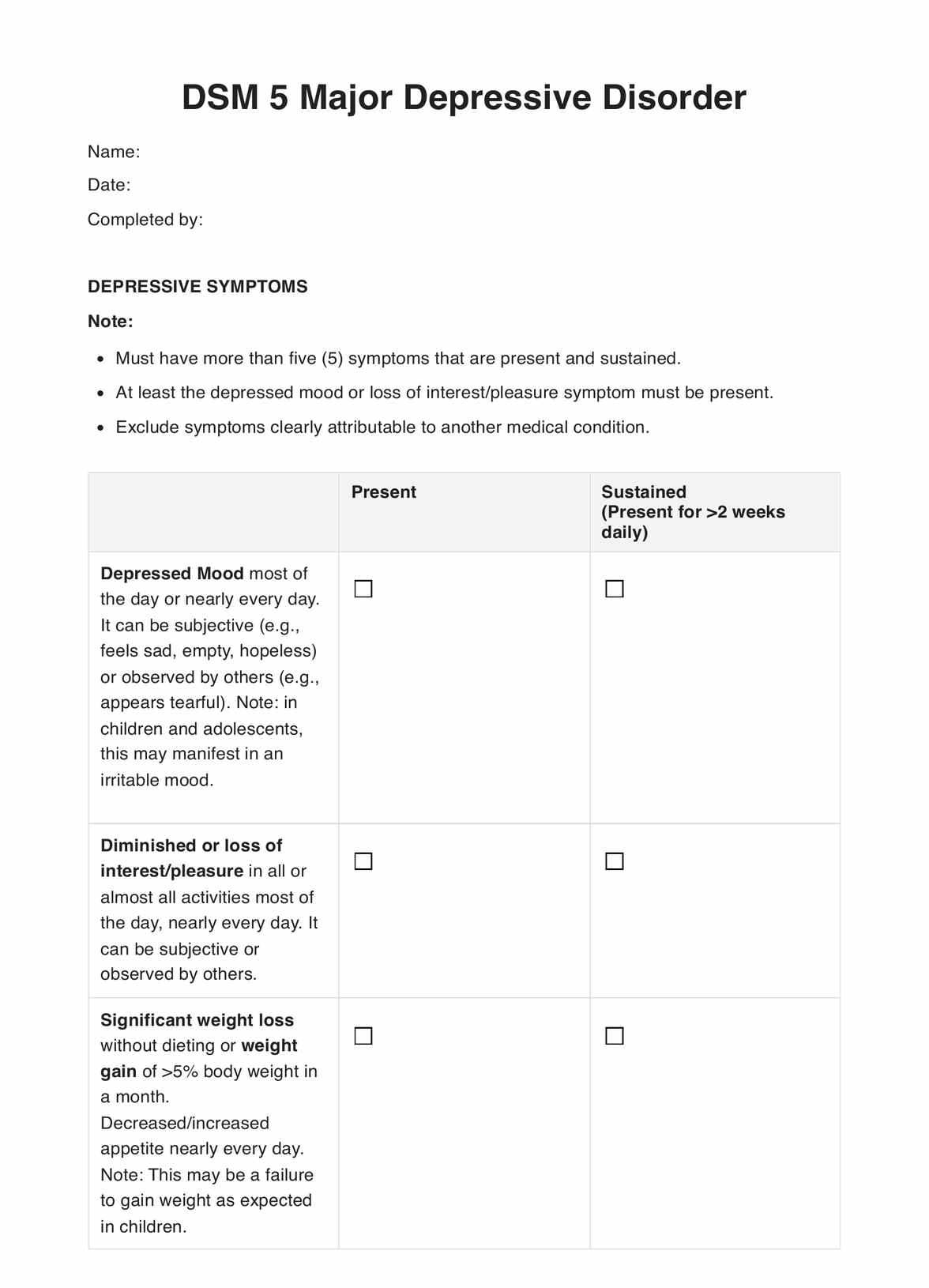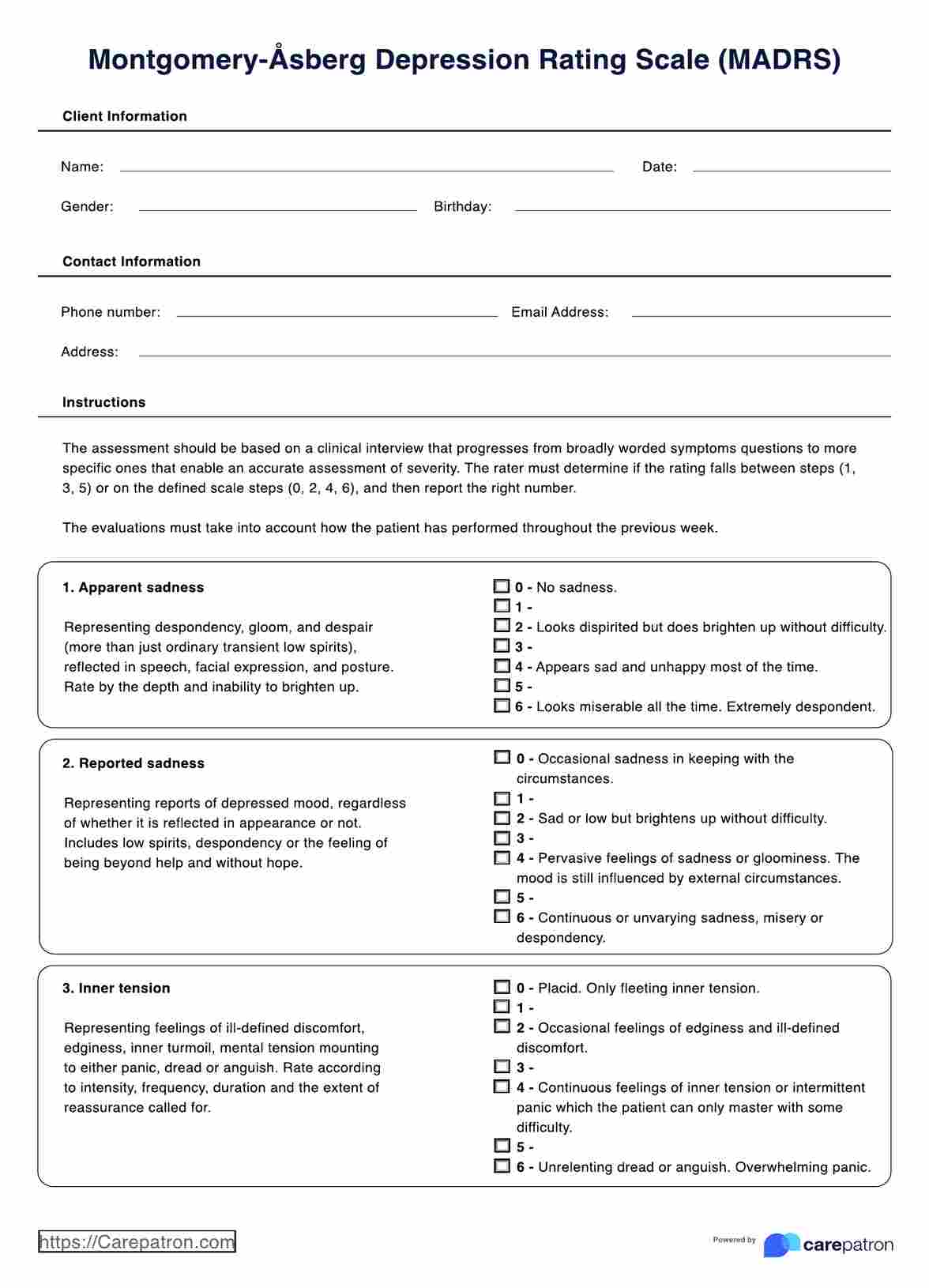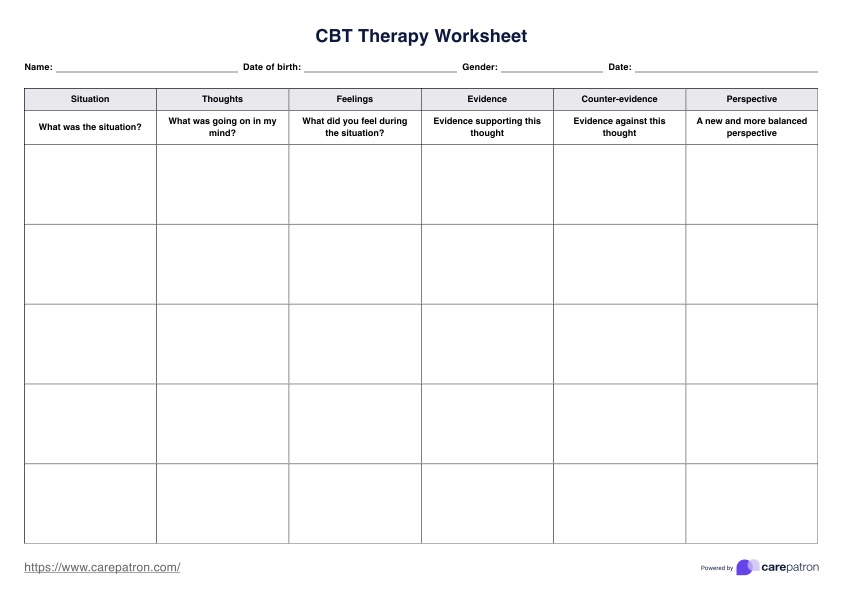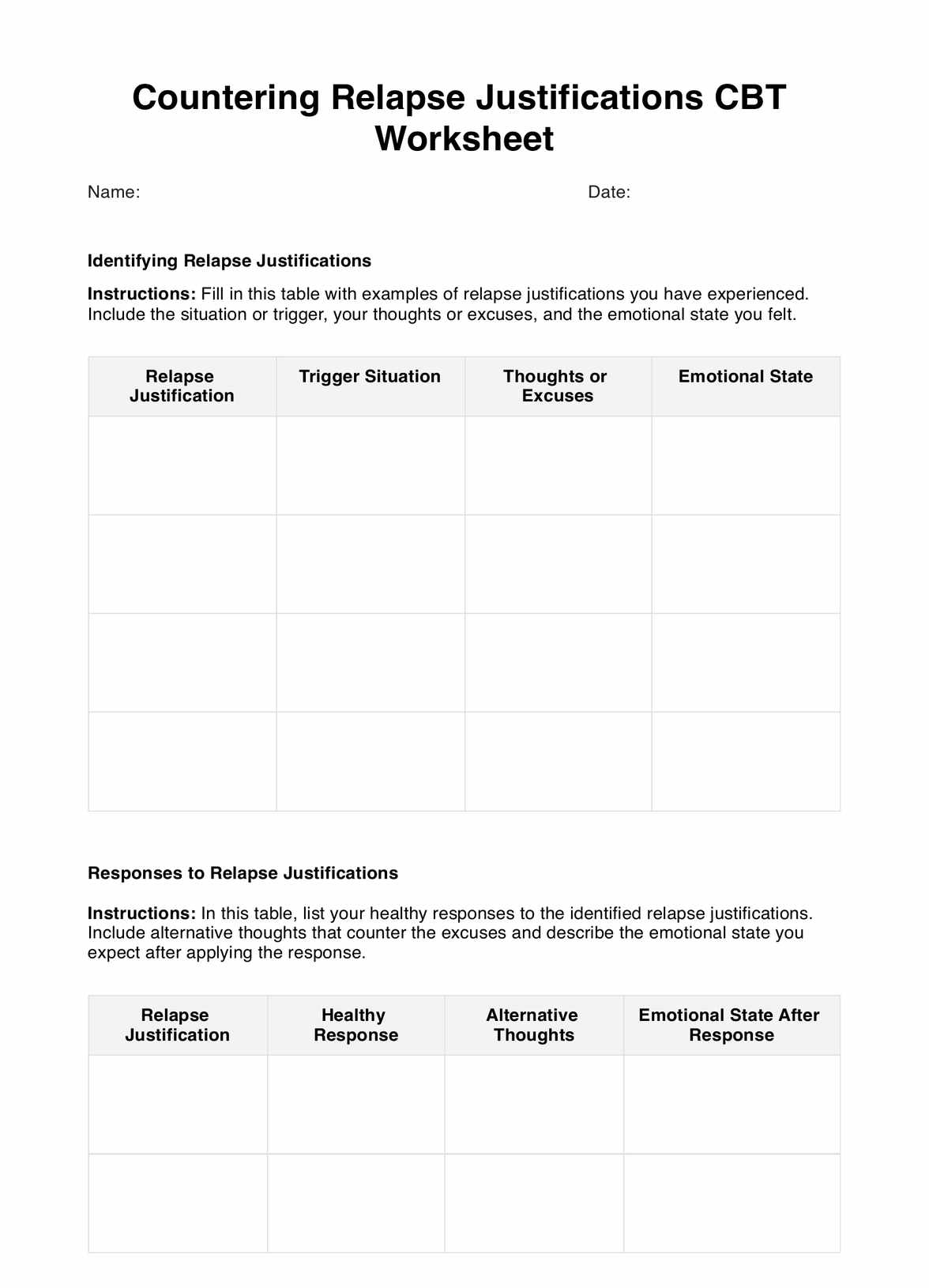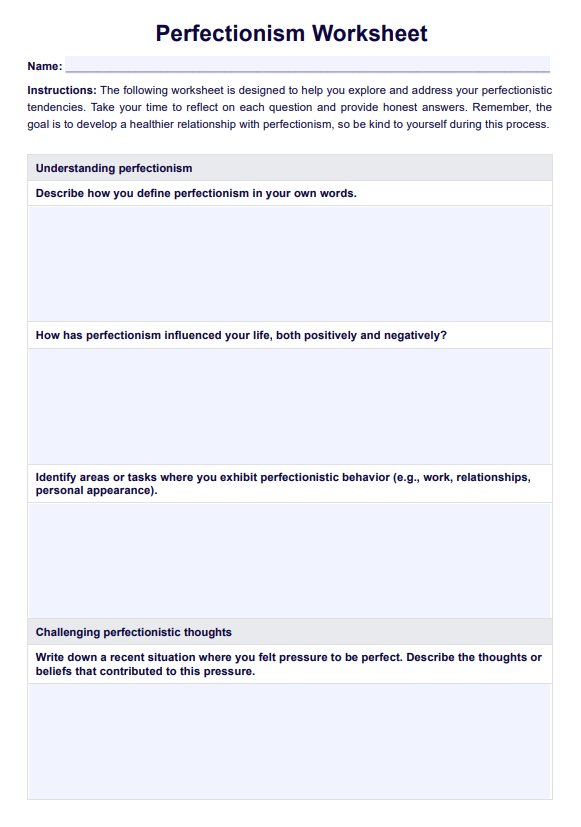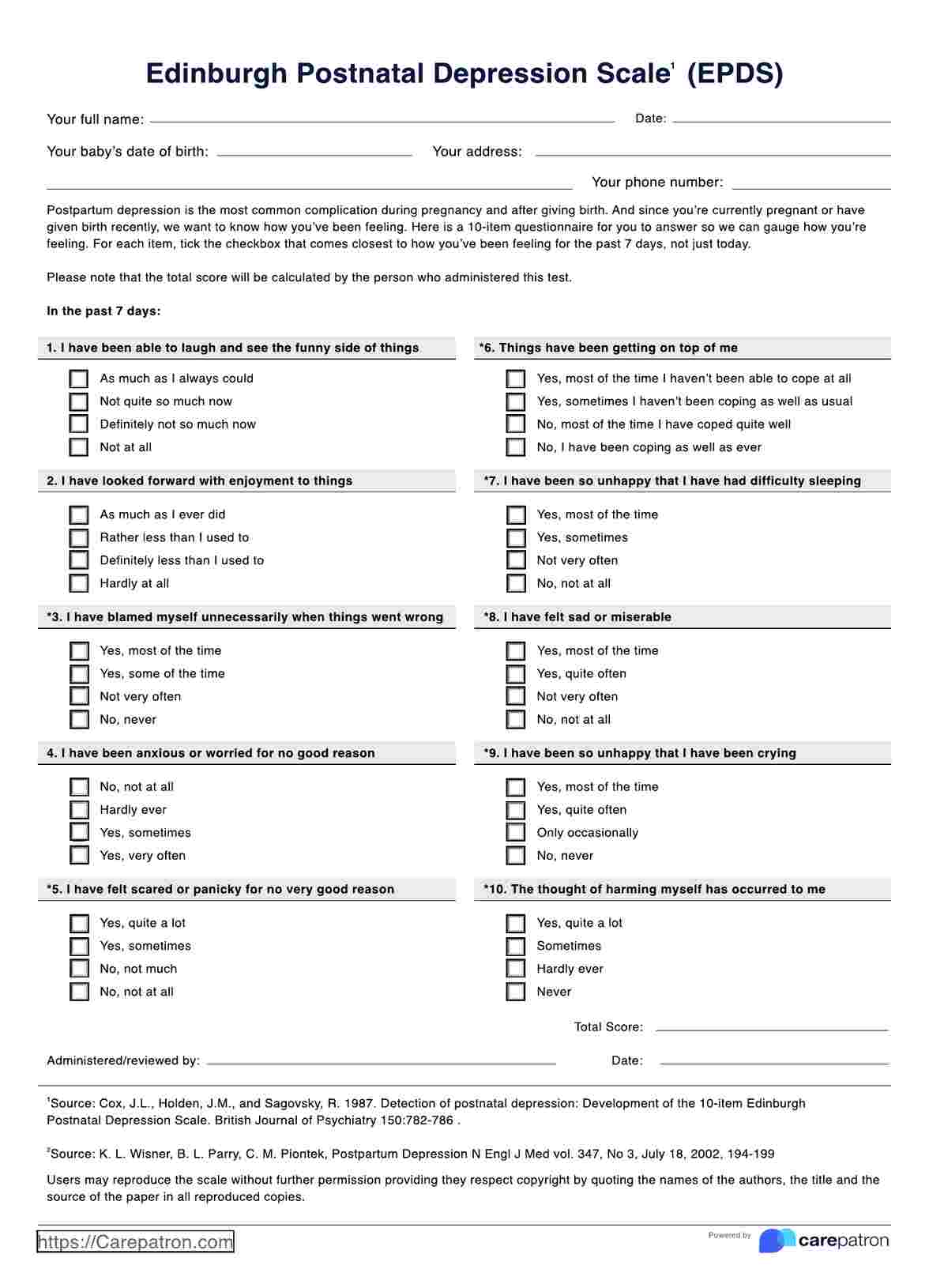Anticipatory Anxiety Worksheets
Manage anticipatory anxiety effectively with our comprehensive Anticipatory Anxiety Worksheet. Empower yourself to conquer your fears.


What is an Anticipatory Anxiety Worksheet?
An anticipatory anxiety worksheet is a therapeutic tool, a specific form of anxiety worksheet, often used in cognitive-behavioral therapy (CBT) or other forms of psychotherapy to help individuals manage and mitigate their anticipatory anxiety. Anticipatory anxiety is the fear or worry that arises when people think about upcoming events, situations, or experiences. This anxiety can be particularly challenging for individuals with anxiety disorders, phobias, or other mental health concerns.
The worksheet typically includes various sections and exercises to guide individuals through identifying, understanding, and ultimately reducing their anticipatory anxiety. Here are some common elements found in a ready anxiety worksheet:
- Identification of Triggers: Individuals are encouraged to identify the specific triggers or situations that provoke their anticipatory anxiety. This could be anything from public speaking to medical procedures.
- Cognitive Exploration: The worksheet may prompt individuals to explore their thought patterns and beliefs surrounding the anticipated event. This involves recognizing irrational or negative thoughts that contribute to anxiety.
- Thought Restructuring: Patients are guided in challenging and reframing their anxious thoughts into more realistic and positive ones. This is a fundamental CBT technique to modify cognitive distortions.
- Relaxation Techniques: Worksheets often include relaxation techniques or coping strategies such as deep breathing, mindfulness, or progressive muscle relaxation to help manage anxiety symptoms.
- Goal Setting: Patients may be asked to set realistic goals for managing their anticipatory anxiety and breaking down the steps to achieve them.
- Behavioral Experiments: Some worksheets may encourage individuals to confront their fears through exposure therapy or systematic desensitization gradually.
are self-help resources that provide practical tools to manage anxiety. Mental health professionals use them as part of a comprehensive treatment plan for anxiety-related disorders. You can find these worksheets and related resources online, in self-help books, or through therapy sessions with trained professionals.
Anticipatory Anxiety Worksheets Template
Anticipatory Anxiety Worksheets Example
How to use the Anticipatory Anxiety Worksheet
Download or Print
Start by obtaining a printable anticipatory anxiety worksheet. These worksheets are often available online or provided by mental health professionals.
Choose the Trigger
Identify the specific event or situation that is causing anticipatory anxiety. This could be a presentation, a social gathering, or a medical appointment.
Write Down Your Thoughts
Record your anxious thoughts and concerns related to the chosen trigger in the worksheet. Be as specific as possible about what worries you.
Identify Cognitive Distortions
Review your recorded thoughts and identify any cognitive distortions. Look for negative thinking patterns, catastrophizing, or unrealistic beliefs contributing to your anxiety.
Challenge Negative Thoughts
Using the worksheet, challenge negative thoughts with evidence and rationality and replace them with balanced and constructive ideas.
Set Realistic Goals
Establish achievable goals for managing your anticipatory anxiety. These goals should be specific, measurable, and time-bound. Write them down in the worksheet.
Explore Relaxation Techniques
Utilize the relaxation exercises provided in the worksheet. Practice techniques like deep breathing, progressive muscle relaxation, or mindfulness to calm your anxiety.
Create an Action Plan
Develop a step-by-step action plan for dealing with the upcoming event. Break down the process into manageable tasks and set a timeline for completion.
Consider Exposure
If appropriate, the worksheet may include exposure exercises. Gradually expose yourself to the feared situation in a controlled manner to desensitize yourself to it.
Regular Review
Revisit the worksheet regularly to track your progress. Note any changes in your thoughts, feelings, or behaviors as you work through your anticipatory anxiety.
Seek Professional Help
Consider seeking professional help for severe or persistent anticipatory anxiety. They can guide you on using the worksheet effectively and tailor it to your needs.
Practice Self-Care
To manage anxiety, prioritize self-care activities, like healthy living, adequate sleep, and relaxation.
When would you use this Worksheet?
Dealing with anticipatory anxiety is a common challenge, and the Anticipatory Anxiety Worksheet can be a valuable resource in various contexts. Here are situations in which mental health practitioners and individuals can effectively use this resource:
- Individual Therapy: During one-on-one therapy sessions, therapists can employ this worksheet to assist clients struggling with anticipatory anxiety disorders, such as social anxiety or specific phobias.
- Group Therapy: In group therapy settings, facilitators can guide participants through the worksheet to address shared anticipatory anxiety triggers, fostering peer support and coping skill development.
- Weddings, Job Interviews, and Presentations: Individuals can use this worksheet when preparing for significant life events, like weddings, job interviews, or public speaking engagements, to alleviate anxiety and enhance performance.
- Self-Improvement: Anyone experiencing anticipatory anxiety can independently utilize the worksheet as part of their self-help toolkit to identify triggers and implement strategies for self-improvement.
- Ongoing Maintenance: Individuals who have previously sought therapy can continue using the worksheet as a maintenance tool to address recurring anxiety triggers.
- Academic Stress: Students grappling with test anxiety or performance-related stress can use this worksheet to manage their emotions and perform at their best.
- Educational Workshops: Educators and counselors can incorporate the worksheet into workshops focused on stress management and student well-being.
- Medical Procedures: Patients facing medical procedures or surgeries can employ the worksheet to mitigate anticipatory anxiety associated with the healthcare experience.
- Rehabilitation: Healthcare professionals can use this resource in rehabilitation settings to support patients in adapting to life changes after an injury or illness.
Benefits
Increased Self-Awareness
Anticipatory anxiety worksheets facilitate a profound exploration of individual triggers and the underlying thought patterns contributing to anticipatory anxiety. This heightened self-awareness empowers individuals to recognize their emotional responses more effectively.
Cognitive Restructuring
These worksheets offer a structured platform for cognitive restructuring, enabling individuals to dissect and challenge deeply ingrained negative thought patterns. Individuals can cultivate healthier and more rational thinking by providing a framework for identifying and addressing cognitive distortions.
Enhanced Coping Skills
Beyond theory, anticipatory anxiety worksheets provide practical coping strategies tailored to each individual's needs. This personalization empowers individuals to develop a comprehensive coping toolkit that suits their specific anxiety triggers and situations.
Stress Reduction
The worksheets target the heart of anticipatory anxiety, offering a tangible means to reduce overall stress levels. By addressing concern at its source—upcoming events or situations—individuals can experience a profound reduction in daily stress.
Improved Decision-Making
Anticipatory anxiety often clouds judgment and decision-making processes. These worksheets help individuals regain clarity and perspective, enabling them to make more rational and effective decisions, free from the interference of anxiety-driven thoughts.
Greater Confidence
As individuals work through anticipatory anxiety worksheets, they gradually build confidence in their ability to confront and manage their anxiety. This newfound self-assurance extends beyond specific events and can transform their overall self-esteem and resilience.
Research & Evidence
Anticipatory anxiety worksheets have evolved as part of the broader cognitive-behavioral therapy (CBT) field, with a rich history of research and evidence supporting its effectiveness. CBT is a psychotherapeutic approach that focuses on identifying and challenging negative thought patterns and behaviors contributing to mental health issues, including anxiety disorders. Using worksheets as therapeutic tools within CBT is integral to this evidence-based approach.
The history of CBT can be traced back to the mid-20th century when psychologists like Albert Ellis and Aaron T. Beck began developing cognitive therapy techniques. These early pioneers recognized the significance of thought processes in shaping emotions and behaviors. Over the years, their work laid the foundation for developing cognitive-behavioral therapy, which has since become one of the most widely practiced and researched forms of psychotherapy.
The use of anticipatory anxiety worksheets within CBT aligns with the principles of this therapeutic approach. Research studies and clinical trials have consistently demonstrated the effectiveness of CBT techniques, including worksheets, in reducing symptoms of anxiety disorders, including anticipatory anxiety. These worksheets help individuals identify, challenge, and reframe negative thought patterns, providing a structured, evidence-based approach to managing stress.
Furthermore, the advent of technology and digital resources has facilitated the accessibility and dissemination of anticipatory anxiety worksheets. Many mental health professionals, organizations, and researchers have contributed to developing and adapting these worksheets to address various anxiety triggers and individual needs.
References
Anticipatory Anxiety - Anxiety Canada. (2019, March 6). Anxiety Canada. https://www.anxietycanada.com/articles/anticipatory-anxiety/
CCI - Anxiety Resources for Clinicians. (n.d.). https://www.cci.health.wa.gov.au/Resources/For-Clinicians/Anxiety
Generalised Anxiety Self-Help Resources - information sheets & workbooks. (n.d.). https://www.cci.health.wa.gov.au/Resources/Looking-After-Yourself/Worry-and-Rumination
Kaur, M. W. D. H. (2023, August 17). Social Anxiety | Psychology Tools. Psychology Tools. https://www.psychologytools.com/self-help/social-anxiety/
Lonczak, H. S., PhD. (2023). Anxiety therapy: types, techniques, and worksheets. PositivePsychology.com. https://positivepsychology.com/anxiety-therapy-techniques-worksheets/#google_vignette
Psychology Tools. (2023, February 21). resource | Psychology Tools. https://www.psychologytools.com/resource/stages-of-social-anxiety/
Commonly asked questions
Anticipatory Anxiety Worksheets are typically used by individuals facing anxiety related to upcoming events or situations and by mental health professionals in therapy settings.
These worksheets are used when individuals want to manage anticipatory anxiety, which arises when thinking about future events. They are employed before, during, and after these events to address anxiety triggers effectively.
Users identify anxiety triggers, record thoughts, challenge negative thought patterns, practice relaxation techniques, set goals, and create action plans to manage anticipatory anxiety. Mental health professionals may guide individuals through this process.


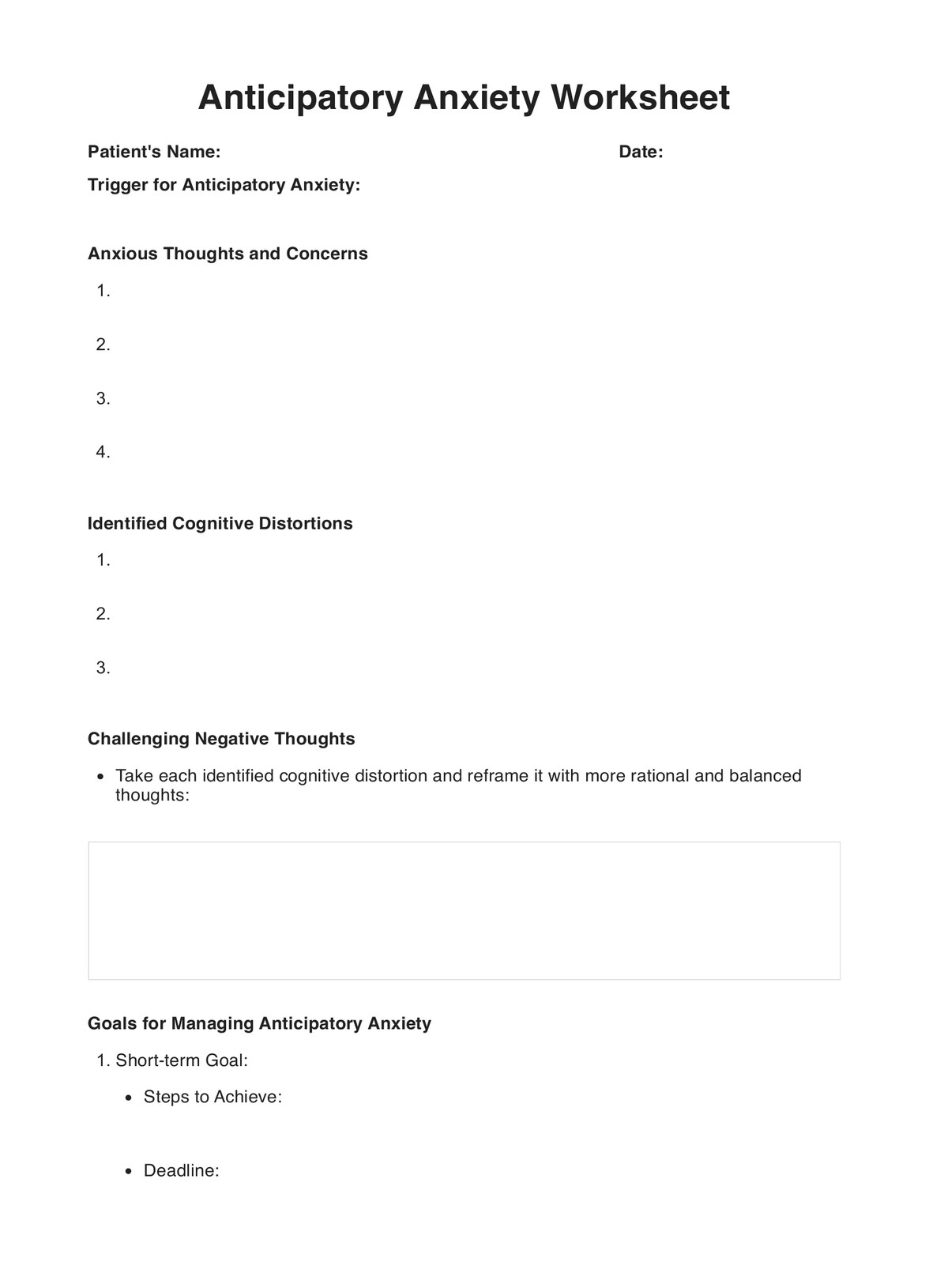
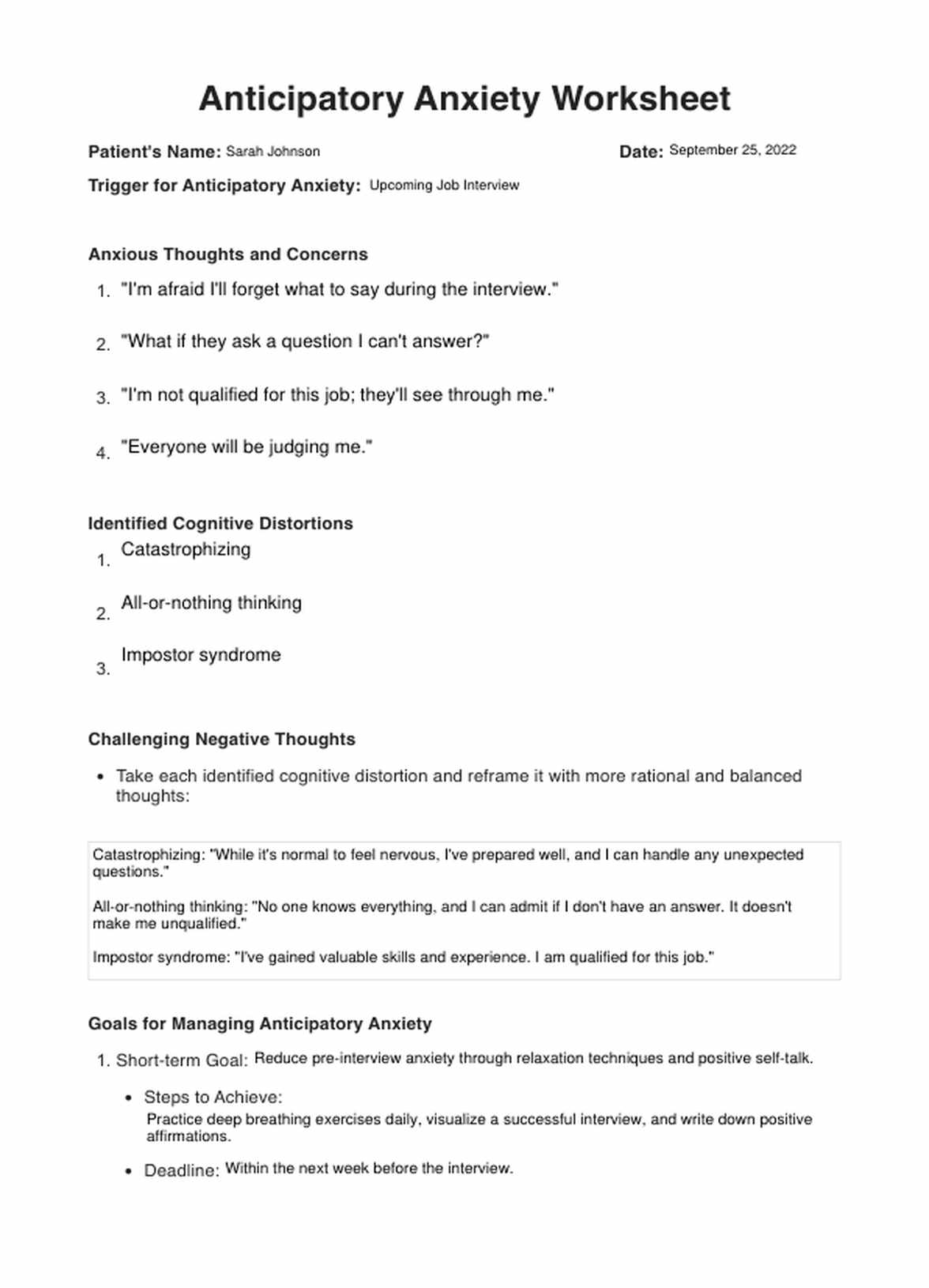















-template.jpg)





















































































